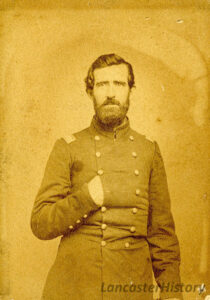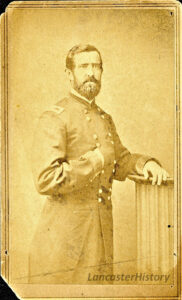General Thomas Welsh: County Native, Devoted Father and Husband, Respected Soldier
In December 2019, LancasterHistory received the General Thomas Welsh Family Papers collection from Richard C. Wiggin, a direct descendent of the General. Thomas Welsh (1824-1863) was born in Columbia, Lancaster County and served with distinction in both the Mexican War and the Civil War. The bulk of the collection consists of original papers and official documents as well as personal and official correspondence written by or to Welsh and his family. With the help of Mr. Wiggin, the entire collection has been cataloged, transcribed, and digitized and is now available to researchers on the LancasterHistory website. May 5, 2021 marks the 197th anniversary of the birth of Thomas Welsh.
Local Origins
Thomas Welsh was born in Columbia, Lancaster County on Third Street between Locust and Walnut Streets. He was the son of Charles and Nancy Daugherty Welsh. Welsh lost his father at the age of 2 and went to work to support his family at age 8. Although he had very little formal schooling and was largely self-educated, he was widely read and even wrote poetry. In 1843, at age 19, he left Lancaster County and worked as an itinerant carpenter and laborer in several cities including Fort Smith, Arkansas and Cincinnati, Ohio.
Mexican War
When the Mexican War broke out in 1846, Welsh enlisted in the 2nd Kentucky Volunteers. He received a severe leg wounded at the Battle of Buena Vista that caused him to limp for the remainder of his life. At the conclusion of his enlistment, he joined the 11th U.S. Infantry Regiment as a second lieutenant. Discharged in 1848 at the conclusion of the war, Welsh returned to Columbia and prospered as a merchant, canal boat owner, justice of the peace, and lock superintendent.
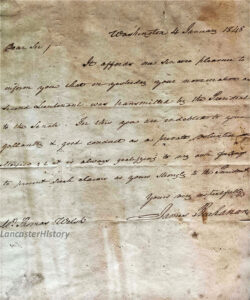
Successful Businessman
As a civilian, Welsh dabbled in politics and received a patronage job in the Pennsylvania Main Line of Public Works, the rail and canal system connecting Philadelphia with Pittsburgh. After several years, he opened up a grocery and dry goods store and became an insurance agent for the Commonwealth Fire Insurance Company and the Penn Mutual Life Insurance Company. In 1850, he married Annie Eunice Young of Wrightsville, York County, Together, they had seven children, six of whom lived to adulthood. In 1857, he was elected Justice of the Peace, and his reputation grew as a community leader. By 1860, he was president of the Borough Council, a founding member of the Columbia Board of Trade, and Vice President of the Columbia Cricket Club.
Civil War
With the outbreak of the Civil War in April 1861, Welsh helped to organize and served as a lieutenant colonel with the 2nd Pennsylvania Infantry Regiment. At the conclusion of the regiment’s 90-day enlistment, Welsh then served as Commandant of Camp Curtin and colonel of the 45th Pennsylvania Volunteer Infantry Regiment, Army of the Potomac. After brief service outside Washington, the regiment was posted to Otter Creek, South Carolina. Following the Battle of James Island in June 1862, the regiment was recalled to Newport News, Virginia and then sent to guard Aquia Creek, Virginia.
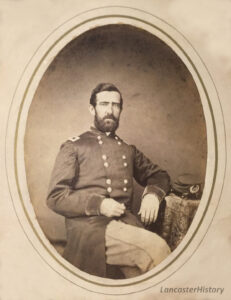
Promotion to General and Unexpected Death
In September 1862, Welsh was placed in command of the 2nd Brigade of General Orlando B. Willcox’s division of General Ambrose E. Burnside’s IX Corps where he served with distinction at the battles of South Mountain and Antietam; a command that included the 45th Pennsylvania. His gallantry earned him a field promotion to brigadier general, confirmed by Congress on March 13, 1863. In April 1863, Welsh went to Cincinnati to serve under the command of General Burnside, who was now in charge of the Department of the Ohio. Burnside placed Welsh in command of the 1st Division of the IX Corps to support General Grant’s Vicksburg campaign. After Vicksburg fell, the division then defeated Confederate General Johnston at the Battle of Jackson. Welsh contracted malaria in the southern swamps and returned to Cincinnati where he died on August 14, 1863 at the age of 39. He is buried in Mount Bethel Cemetery, Columbia.
Devoted Husband and Father
Despite his limited education, Thomas Welsh was a very literate man. He wrote concise and highly detailed after-action military reports. Welsh also transcribed and wrote his own poetry. One such poem simply titled “The Orphan” poignantly reflected upon the early loss of his mother and father and described the friendship and support he found in God as father and friend. In another, he called “I’ve Left My Home,” Welsh reflected about leaving his home in Columbia and his expectation of making new friends wherever he went.
A devoted father and husband, he consistently wrote to his wife and six surviving children, enquiring about their activities and affirming how much he missed being with them. In one such letter dated September 14, 1862 at the time of the Battle of South Mountain, Welsh wrote of a feeling that “a great Battle will be fought between here and Hagerstown within a few days” and to “take the children and go to Lebanon” if Confederate forces should approach Columbia.
When the Confederate Army did indeed enter Pennsylvania in June 1863, the Union Army burned the Wrightsville-Columbia covered bridge over the Susquehanna River on June 28 to prevent Confederate forces from crossing the river. In a letter dated July 1, 1863, Annie Welsh, wrote to her husband describing the approach of the Confederates, the fleeing of citizens from York County across the bridge, the reactions of various people in Columbia, her determination to stay in Columbia, and the terrible sight of seeing the bridge on fire.
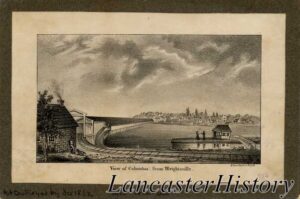
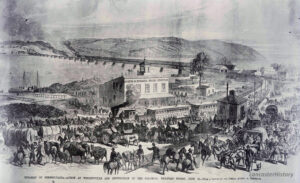
Respected Soldier
At the time of his death, The Daily Times of Cincinnati noted, “As a solder, General Welsh has always served with distinction, commanding obedience and attracting affectionate regard from all under him. As a man, he was true in every sense of the world.” General John F. Hartranft, a fellow Pennsylvanian who served with Welsh under General Burnside and who would later serve as governor, wrote to Annie Welsh asking for information on her husband for a history of the IX Corps then being written by General Burnside. In his letter dated September 11, 1866, Hartranft wrote, “Your Husband was a companion in arms for whom I had great respect as a solider and a Gentleman. I regret that he was not permitted to live longer to enjoy the blessings of peace.”
Post #118 of the Columbia chapter of the Grand Army of the Republic, founded in 1868, was named after Welsh. Welsh was also honored with a bronze bust erected at the Vicksburg National Military Park in Mississippi in 1913 on the occasion of the 50th anniversary of his death.
From Archives Blog
